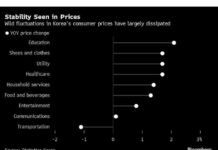Visa, the world’s largest payments network, is facing legal trouble as the U.S. Justice Department has filed a civil antitrust suit against the company in New York. The DOJ alleges that Visa has established an illegal monopoly over debit payments by imposing exclusionary agreements on partners and stifling competition from smaller firms. This has led to American consumers and merchants paying billions of dollars in additional fees, according to the lawsuit.
The Attorney General, Merrick Garland, stated, “We allege that Visa has unlawfully amassed the power to extract fees that far exceed what it could charge in a competitive market.” Garland further explained that the costs imposed by Visa are ultimately passed on to consumers through higher prices or reduced quality of service, affecting the price of “nearly everything.”
Visa and its competitor MasterCard have seen significant growth over the past two decades, with a combined market cap of approximately $1 trillion. The rise in popularity of credit and debit cards for transactions has allowed these companies to act as intermediaries, facilitating payments between merchants’ banks and cardholders.
However, Visa’s dominance in the market has drawn scrutiny from regulators and retailers alike. In 2020, the DOJ attempted to block Visa’s acquisition of fintech company Plaid, citing antitrust concerns. Although the companies initially resisted the lawsuit, they eventually abandoned the $5.3 billion takeover.
In a separate development, Visa and Mastercard agreed to limit their fees and allow merchants to charge customers for using credit cards. This deal was estimated to save retailers $30 billion over five years. However, a federal judge rejected the settlement, suggesting that the networks could afford to offer a more substantial agreement.
The DOJ claims that Visa leverages its market dominance to enforce exclusionary agreements on merchants and banks, penalizing those who choose to route transactions through alternative payment systems. Additionally, when faced with potential competition, Visa allegedly engages in tactics to stifle rivals’ growth and prevent them from challenging its position in the market.
As the Biden administration comes to a close, regulatory agencies have intensified their efforts to address monopolistic practices in various industries. The Federal Trade Commission and the Consumer Financial Protection Bureau have taken action against intermediaries for inflating drug prices and imposing excessive fees on consumers.
In a strategic move to enhance competition in the payments industry, credit card lender Capital One recently announced its acquisition of Discover Financial in a $35.3 billion deal. The acquisition is expected to bolster Discover’s position as a competitor to Visa and Mastercard, with Capital One planning to transition its debit and credit card volume to Discover over time.
In conclusion, the legal battle between Visa and the U.S. Justice Department sheds light on the challenges posed by monopolistic practices in the payments industry. The outcome of this lawsuit will have significant implications for the future of competition and consumer protection in the financial sector. Stay tuned for updates on this developing story.






















